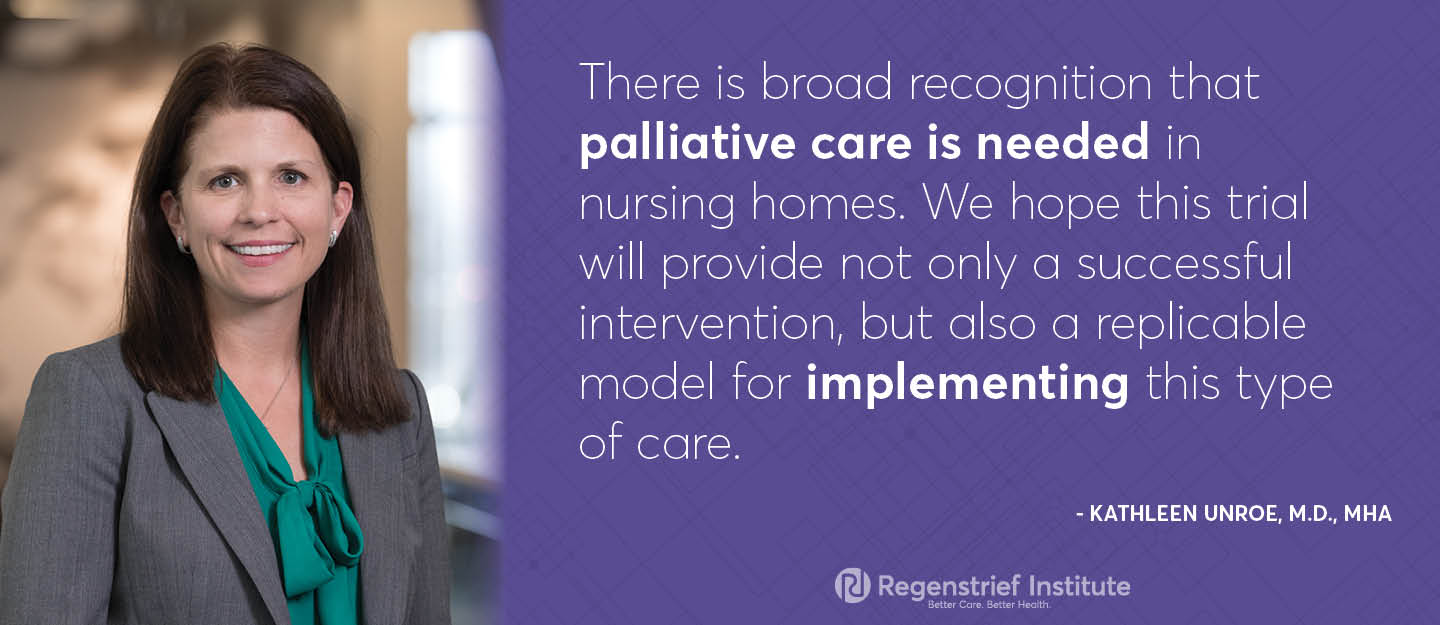$3.5 million NIA grant will support intervention to care for patients with Alzheimer’s
Research scientists from Regenstrief Institute, Indiana University School of Medicine and University of Maryland are working to develop a model for delivering palliative care to people living in nursing homes to improve their quality of life. While access to palliative care has become the standard of care in the hospital setting, it is not routinely available in nursing homes.
Palliative care is focused on providing comfort and relief from the symptoms and stress of illness and, if desired, can be provided along with curative treatment. The goal is to improve quality of life for both the patient and family.
Nearly every nursing home resident could benefit from palliative care, but the quality and quantity of care varies widely. There are currently few examples to guide nursing homes in implementing palliative care.
The research scientists received a grant from the National Institutes of Health’s National Institute on Aging to fund a model for delivering palliative care to patients with Alzheimer’s disease. The grant is expected to total nearly $3.5 million over five years.
The trial, UPLIFT-AD (Utilizing Palliative Leaders In Facilities to Transform care for Alzheimer’s Disease), is a clinical trial designed to enhance quality of care and support. The project will build capacity for palliative care within facilities and provide external support for that care. The research team will partner with eight nursing homes in Indiana and eight in Maryland to evaluate the impact of UPLIFT-AD.
“There is broad recognition that palliative care is needed in nursing homes, but there is no road map for how to provide it well,” said project co-leader Kathleen Unroe, M.D., MHA, Regenstrief research scientist and IU School of Medicine associate professor of medicine. “We hope this trial will provide not only a successful intervention, but also a replicable model for implementing this type of care.”
The research team will identify two champions to lead the intervention within each nursing home. In addition, education about the fundamentals of palliative care will be given to all staff. The instruction includes basic interventions for common symptoms, such as shortness of breath and pain, so that all staff can provide some level of palliative care.
External consultants will work with the champions to identify residents who need more palliative care support. In Indiana, the team is partnering with the Eskenazi Health Palliative Care Team. In Maryland, the researchers are working with Gilchrist, a local provider of palliative care services. Experts from these community-based partners will focus on nursing home residents with medically complex conditions and difficult-to-manage symptoms. The consulting teams will meet weekly to develop care plans to provide relief to the residents.
“These residents and their families deserve the comfort, dignity, and supportive services that palliative care provides,” said study co-leader, John Cagle, PhD, an associate professor from the University of Maryland School of Social Work. “Palliative care is already a standard of care in many other settings, including hospitals and cancer treatment centers. This study will provide evidence and fill in gaps to help nursing homes deliver this important care to their residents.”
“The need for palliative care programs is especially urgent in light of the COVID-19 pandemic, when many patients are separated from their families and may be suffering from more symptoms,” said Dr. Unroe.
The study is led by a multidisciplinary team. Dr. Unroe is a geriatrician practicing in the nursing home setting. Dr. Cagle has worked extensively as a hospice social worker. The researchers are working with the Eskenazi Health Palliative Care and Gilchrist teams for consultations.
The team is also prepared to adjust delivery of the intervention to comply with COVID-19 restrictions that may exist throughout the study.
This research was supported by the National Institutes of Health’s National Institute on Aging, grant R01AG066922.
Other investigators on the grant are Regenstrief research scientist and IU School of Medicine interim Department of Biostatistics chair, Wanzhu Tu, PhD, and Mary Ersek, PhD, R.N., from University of Pennsylvania School of Nursing. Erin O’Kelly Phillips, MPH from Regenstrief is the research manager.
About Regenstrief Institute
Founded in 1969 in Indianapolis, the Regenstrief Institute is a local, national and global leader dedicated to a world where better information empowers people to end disease and realize true health. A key research partner to Indiana University, Regenstrief and its research scientists are responsible for a growing number of major healthcare innovations and studies. Examples range from the development of global health information technology standards that enable the use and interoperability of electronic health records to improving patient-physician communications, to creating models of care that inform practice and improve the lives of patients around the globe.
Regenstrief Institute is celebrating 50 years of healthcare innovation. Sam Regenstrief, a successful entrepreneur from Connersville, Indiana, founded the institute with the goal of making healthcare more efficient and accessible for everyone. His vision continues to guide the institute’s research mission.
About IU School of Medicine
IU School of Medicine is the largest medical school in the U.S. and is annually ranked among the top medical schools in the nation by U.S. News & World Report. The school offers high-quality medical education, access to leading medical research and rich campus life in nine Indiana cities, including rural and urban locations consistently recognized for livability.
About University of Maryland School of Social Work
The mission at the University of Maryland School of Social Work is to develop practitioners, leaders and scholars to advance the well-being of populations and communities and to promote social justice. As national leaders, we create and use knowledge for education, service innovation, and policy development.
About Kathleen Tschantz Unroe, M.D., MHA
In addition to being a research scientist at Regenstrief Institute, Kathleen Unroe, M.D., MHA, is an associate professor at Indiana University School of Medicine and a geriatrician practicing in the nursing home setting.











